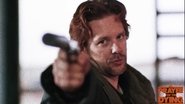Cristi_Ciopron
In his youth, Rourke looked like a lion, a big feline, he was extremely leonine and robust—the way Brando,De Niro,Cagney and Gabin were leonine. Then, all the directors began casting him as a freak or a brute or a Cro-Magnon. It seems that from a certain moment on he has found only imbeciles to cast him—as there certainly can be no rational explication for this chronic miscasting.Very seldom one finds such a freshness, integrity, sincerity and inspiration as could be seen in Rourke's youth roles. He was among the best. For the columnists it is a routine they resort to,to compare each new promising actor with Brando, Dean, Clift, Pacino, Nicholson and De Niro (or,if he looks like a nice man, with Stewart, Grant, Cooper,etc.). I was very touched when I've read such things for the first time—then I saw that it was a routine,a cliché the journalists used periodically for every new talent. The journalists did this with Cruise, with Hanks, with everybody, with every newcomer that showed some talent and that promised. But with Rourke these comparisons were true. He was the new Brando, the new De Niro; not as good as Clift and Pacino,but better than Nicholson.Like those already mentioned here, and like some others, like Widmark and Robinson and Crowe and Fresnay, Rourke was one of the actors really deserving being seen. I remember with emotion the era of my intense admiration for him and for his roles—they were unique ,magic, matchless, unequaled. I know his blazing, dazzling beauty. He was made for things infinitely greater than the crap that recently has again brought him success—a crap success, this time. I have seen the whole art of the actor in his intense and virile performances. He was great—in an intensely romantic and blazing way.His class of movies were the action dramas--Year of the Dragon (1985), A Prayer for the Dying (1987), Johnny Handsome (1989), Desperate Hours (1990).But even his more genre movies were in fact no genre movies at all—they were merely Rourke movies. Nine 1/2 Weeks (1986) showcases his great role—and also Mrs. Basinger's. (It is really unimportant that he detested her—he used to detest everybody—Mrs. Basinger, Gibson, Cruise,Costner,De Niro,Nicholson,the blockbuster stars, etc.).His youth leonine look had a very exciting human dimension. He was above all his colleagues, above all the competitors of the '80s. He began with declarations a la Gibson (Gibson has begun earlier, but not better); Gibson was very vocal about his independence and not selling himself to the Hollywoodian industry. Rourke tried the same thing—extremely angry, but also quite imprudent. At the beginning of the '80s we find Gibson protesting against Hollywood, speaking loud against the system, etc., I still have my old almanacs from the early '80s were Gibson's declarations were picked, and then towards the end of the decade we find Gibson perfectly integrated in the Hollywoodian machine and industry and making one blockbuster after another. Gibson changed; I do not know why, or if he ever spoke about his conversion to the system he hated and abhorred and rejected. Rourke continued his career through the mid '80s much better than Gibson; from '82 to '89 he received very advantageous roles. He is a great '80s actor. Practically, he did not pass the '80s; he did not enter as an actor in the following decades. Some of his roles in the '80s are true creations. They really are somehow wild masterpieces of artistic intelligence and of unfailing instinct—all those Stanley White, Harold Angel, Martin Fallon, Henry Chinaski, John Sedley and Michael Bosworth of his. The movies themselves might—or might not be—very good; the scripts were sometimes crap, rubbish, stupid. Yet all his characters were very well made, as if he had a huge reservoir of power to spend and to deploy—it is very impressing. Writing these lines about Rourke's career in the '80s I do not target any one of his films from that period in particular— rather I speak about all of them.In the '90s, Harley Davidson and the Marlboro Man (1991) was a piece of fun—of honest and quite manly fun, not as ridiculous as it is thought by many. But then he began to be cast mainly as a character actor—which he isn't. He was an actor of leonine strength, not a character actor.He looked like a lion; they cast him as to make him look like an idiot or as a freak.Rourke naturally belongs to another sphere, that of a psychological cinema ,very method acting oriented, the same way Newman, Brando, Pacino, Clift, De Niro belong. He is not from this spoofing parodying deconstructive cinema—his roles of Marv ,etc., are horrible miscasts. And the only interesting directors—Shyamalan and Christopher Nolan and Michael Mann, or Woo, Cohen, or a few others, do not seem to have approached him.To me, Rourke means much of what was good in the '80s in a certain mainstream cinema. And not only means, but, concretely, is. He was the only leonine young presence in the '80s cinema. He has no American successors that I know of (Depp and Pitt may give appropriate or elegant or strong performances and are often interesting –but they never show Rourke's leonine quality; the same goes for some of his most gifted friends—like Roberts and Penn …). (To be entirely fair, it must be admitted that later Gibson did develop this virile force on screen.) In his own way, Rourke was, during the '80s, larger than life but without betraying his roles. They were compact blazing straightforward roles .Being so much of a fan of his, and accidentally reviewing only some of his crap new movies since I have started writing on IMDb, I felt the desire of giving here this more synthetic take on his early career and speak my mind here about who do I think he really was. Thank you.












